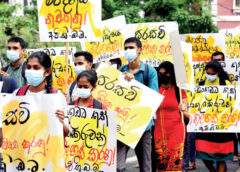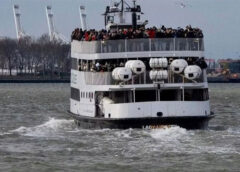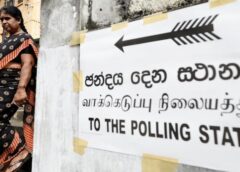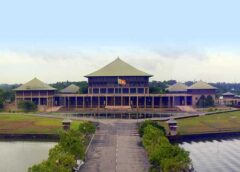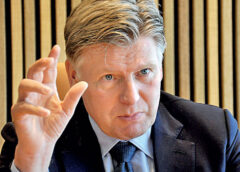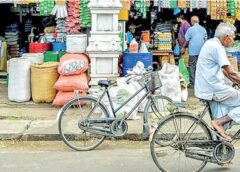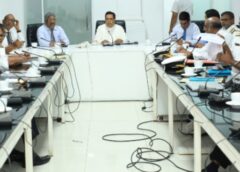Peddling the Government’s Narratives As of now, Ranil Wickremesinghe has three points in his favour. First, there is the IMF deal, which his government is more or less using as a shield against criticism of the many austerity measures being enforced in its name. Second, there is the SJB-UNP nexus or the many not so subtle commonalities that have linked the main opposition with the president’s party. Third, there is the SJB-JVP-NPP divide that has only fragmented the opposition to the government’s benefit. Contrary to what the neoliberal commentariat may…
Read MoreAuthor: admin
India-Lanka ferry service is still on rocky seas
India-Lanka ferry service is still on rocky seas The chances of having a ferry service between India and Sri Lanka by the end of this year seem likely provided both India and Sri Lanka are clear about the details Replying to the demands for grants for the departments concerned in the Tamil Nadu Assembly early this month, Highways and Minor Ports Minister E V Velusaid that efforts are underway to launch a short ferry service between Rameswaram and Sri Lanka in a few months’ time. The idea is to link Rameswaram…
Read MoreCivil Society Collective calls on diplomatic missions to ensure LG polls are held
Civil Society Collective calls on diplomatic missions to ensure LG polls are held The Civil Society Collective for Protecting the Franchise has sought the support of Diplomatic Missions with regard to their call to hold the 2023 Local Government (LG) election on time, in a bid to protect democracy. Issuing a statement in this regard, the collective highlighted that failing to hold the LG polls in a timely manner would have serious implications for democracy and governance. “It would mean that the constitutional right to elect representatives at the local…
Read MoreSri Lanka to raise duty-free allowance for migrant workers to encourage remittance
Sri Lanka to raise duty-free allowance for migrant workers to encourage remittance COLOMBO, April 3 (Xinhua) — Sri Lanka is set to increase duty-free allowances for migrant workers at the airport starting May in order to encourage remittance, Minister of Labor and Foreign Employment Manusha Nanayakkara said on Monday. The increase will be based on the amount of money remitted by the workers, Nanayakkara said during a media briefing. Under the new scheme, there will be five categories of concessions. For people having remitted 2,400-4,799, 4,800-7,199, 7,200-11,999, 12,000-23,999 and 24,000…
Read MoreCPA Statement on the Anti-Terrorism Bill – 2023
CPA Statement on the Anti-Terrorism Bill – 2023 The Centre for Policy Alternatives (CPA) observes that the Government published an ‘Anti – Terrorism Bill’ in the Gazette, on the 22nd of March 2023. This Bill seeks to abolish the Prevention of Terrorism Act (PTA) and introduce an Anti-Terrorism Act. Such legal reforms must be studied in the context of the abuse of the PTA and Emergency Powers carried out by consecutive Presidential regimes, with the present draft providing broad powers to the executive with limited checks and balances. CPA notes that…
Read MoreTourist arrivals top 100,000 in March marking historic hat-trick post-2019
Tourist arrivals top 100,000 in March marking historic hat-trick post-2019 First 26 days of March draw 105,714 tourists, pushing Q1 arrivals to 315,898 Russia leads as top market with 22,038, followed by India, UK, Germany and US Tourism Minister Harin Fernando applauds industry stakeholders’ efforts for strong comeback in 2023 By Charumini de Silva With arrivals surpassing the 100,000 mark in the first 26 days of March, Sri Lanka’s tourism industry has welcomed over 300,000 visitors in the first quarter, starting 2023 on a positive note. This is also the…
Read MoreMcKinsey mantra for Sri Lanka
McKinsey mantra for Sri Lanka McKinsey Senior Partner Chair of Insights and Ecosystems Sven Smit moots likely Indian century ahead and says strategically located Sri Lanka stands to gain Describes Sri Lanka’s potential as solid and this could be realised with right strategies, competence and competitiveness and make Sri Lanka grows better and bigger than it had in the past Stresses Sri Lanka must find its own positioning in the region and globally By Nisthar Cassim Renowned global management consulting firm McKinsey is urging Sri Lanka to use the strategic…
Read MoreQuick impressions on post-war development Jaffna revisited
Quick impressions on post-war development Jaffna revisited The recent visit to Jaffna, after several years of forbidden travel due to the pandemic, provided an opportunity to revisit areas of interest and observe the changes, including positive and negative developments, in both the economic and social fronts. It was a quick visit and unexpectedly the timing of the visit coincided with the visit of the President who declared open the Jaffna Cultural Centre on 11 February 2023. The festive atmosphere that prevailed on that day was combined with a subdued celebration…
Read MoreSri Lanka to seek competitive bids for state asset sales
Sri Lanka to seek competitive bids for state asset sales ECONOMYNEXT – Sri Lanka will adopt a competitive bidding process for asset sales and will shortly call for expressions of interest from transaction advisors to support the divestment program, the head of the state enterprise re-structuring unit Suresh Shah said. All assets will be sold through a competitive bidding process and no unsolicited bids will be accepted. The first step will be to select transaction advisors. “We will work with development financial institutions and qualified and experienced consultancy firms to…
Read MoreKaraikal-KKS ferry service to commence on 29 April
Karaikal-KKS ferry service to commence on 29 April Minister of Ports, Shipping and Aviation, Nimal Siripala de Silva said the first ferry line, of the new ferry service, to be operated between Karaikal Port in Puducherry, India and Kankesanturai (KKS), is scheduled to call at the KKS Port on 29 April. The Minister disclosed this information at a discussion, with the stakeholders of this new ferry service, held recently at the Ministry. A passenger terminal was built at the KKS Port as part of infrastructure development for the new ferry…
Read More